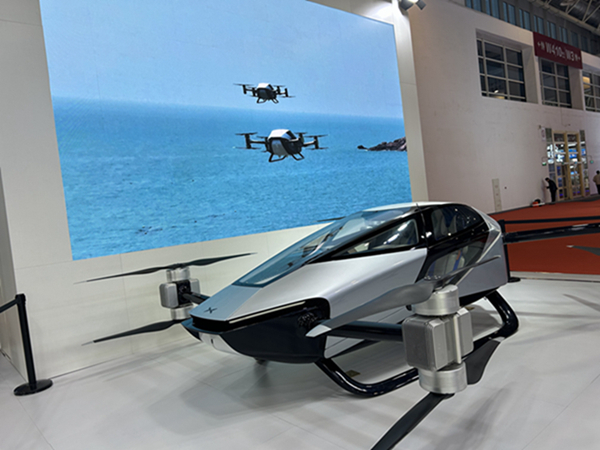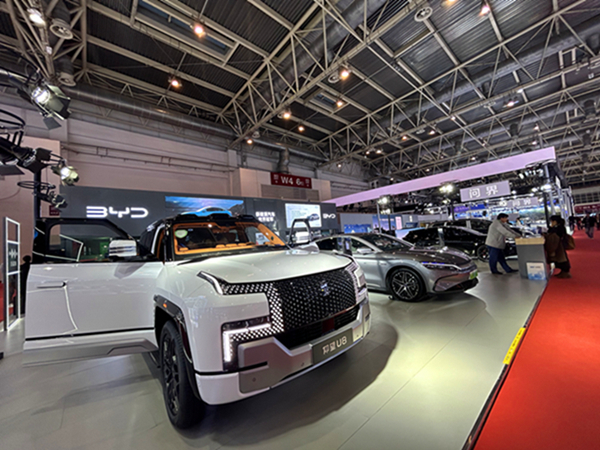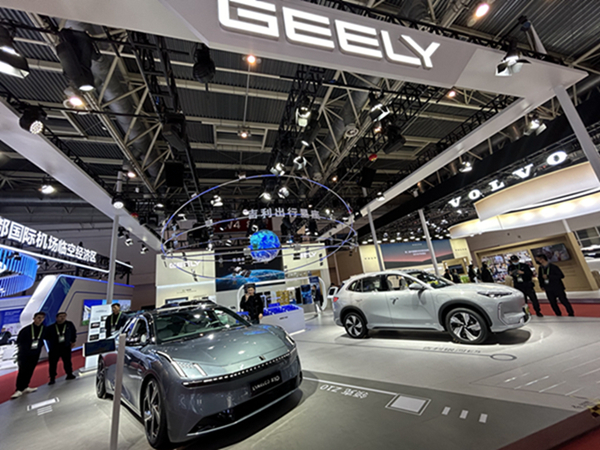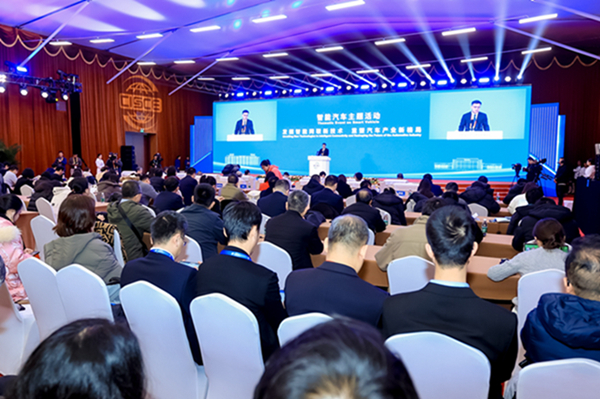
 0 Comment(s)
0 Comment(s) Print
Print E-mail China.org.cn, November 30, 2024
E-mail China.org.cn, November 30, 2024
One of the highlights at the second China International Supply Chain Expo (CISCE) currently underway in Beijing is the exhibition of the XPeng X2, the world's first flying car developed by Chinese electric vehicle maker XPeng. The two-seater aircraft is transported and recharged by the company's Land Aircraft Carrier, an electric-powered truck.

"XPeng's flying car is a testament to our commitment to creating the safest and smartest cars for individual users, providing the best solutions for human urban transportation," said Chen Han, vice president of XPeng. "We aim to achieve the lowest energy consumption and the fastest charging speed."
The flying car, which does not produce any carbon dioxide emissions during flight, was demonstrated at the 15th China International Aviation and Aerospace Exhibition earlier this month. Chen mentioned that the company has received more than 2,000 preorders since the airshow, the highest number for any flying car, and they hope to deliver them all to customers by 2026.
Beyond the flying car, the expo spotlighted other aspects of smart vehicle technology. Exhibitors including global players like Bosch, Volvo, BYD and Xiaomi showcased new products and technologies, emphasizing the comprehensive and innovative nature of the smart vehicle sector spanning from raw materials to finished products.
The event also underscored the depth and sophistication of China's supply chain in the intelligent connected vehicle (ICV) sector, which combines automotive, electronics and communication technologies. Zhang Shaogang, vice chairman of the China Council for the Promotion of International Trade (CCPIT), noted the strategic emergence of this sector as a pivotal element in the global automotive industry.

"In recent years, China has actively advanced the automotive industry's transformation toward electrification, connectivity and intelligence. It has reinforced the industrial ecosystem, intensified supply chain collaboration and enhanced technological innovation," Zhang said. "The country has developed a comprehensive industry framework, including key components like base chips, sensors and computing platforms, thereby accelerating the progression of the ICV industry."
"The Chinese government highly values international exchanges, vigorously promotes trade and investment cooperation, leads in establishing technical regulations like electric vehicle safety and battery durability, and shares development opportunities and benefits globally," he added.
Yao Jie, chief supervisor of the China Association of Automobile Manufacturers, pointed to the substantial advancements in China's automotive industry. The nation has pioneered new energy and intelligent connected vehicles on a global scale, driven by continuous innovation and an extensive industrial framework encompassing key technologies like sensors and computing platforms.
He also noted that China's automotive industry has transitioned from project to product competition, and now to brand competition. Chinese brands, including new energy vehicles, now match or even surpass multinational and globally recognized brands in certain areas, signifying a new phase in brand competition. He emphasized that a complete, resilient and dynamic supply chain with sustainable development is crucial in supporting and enhancing the competitiveness of Chinese brands.

However, on Oct. 29, the EU announced a controversial decision to impose tariffs of up to 45.3% on Chinese-made EVs for at least five years. China does not approve of or accept the decision and has appealed to the WTO. Since then, Chinese and EU technical teams have been engaging in several rounds of discussions to find a proper resolution.
Kaan Masat??, an automotive industry specialist in the Investment Office of the Presidency of the Republic of Türkiye, encouraged Chinese EV makers to establish operations in Türkiye. He highlighted benefits such as inclusion in the EU tax system and customs union, which allows products manufactured in Türkiye to be sold directly to the EU without European regulatory constraints. Additionally, Türkiye has free trade agreements with 13 countries and imposes no customs duties on entries, fostering a symbiotic relationship. Masat??, after extensive discussions with Chinese carmakers, sees significant potential for Chinese technology to aid in the transformation of Türkiye's automotive industry, aligning with the global shift toward electrification and facilitating supply chain reforms.

At a smart vehicle-themed event on Nov. 27, Long Chuanhong, president of the CCPIT Patent and Trademark Law Office, introduced the Research Report on Overseas Trademark Registration and Protection of China's EV Enterprises, noting that China's NEV industry has rapidly advanced, leading production and sales globally. By mid-November, China had become the first country to produce over 10 million NEVs annually.
Chen Hongbing, director of the Madrid Operations Division of the World Intellectual Property Organization, emphasized the significance of the report, encouraging attendees to consider its recommendations for strategically managing trademarks overseas to mitigate risks and protect rights. He noted that for nearly a century, leading automotive firms have efficiently and cost-effectively used the Madrid System to register trademarks in over 130 countries. Chen urged Chinese automotive companies to leverage this system to protect their brands.
Moreover, a collective initiative was launched at the expo, led by Geely Holding Group, with the aim of jointly creating a future of low-carbon smart mobility. This effort saw participation from major companies like Bosch and Rio Tinto, indicating strong industrywide commitment to sustainable development.
Shen Yuan, senior vice president and CTO of Geely Holding Group, outlined a strategic approach focused on creating a green supply chain, fostering innovation-driven growth, and building an ecosystem conducive to smart mobility. The initiative envisions enhanced international cooperation and engagement in global standards development, aligning with broader goals to promote greener, smarter automotive solutions worldwide.